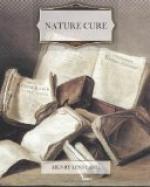The increased expenditure of vital energy was made possible at the expense of the reserve supply of vitality; therefore the depression following it is in proportion to the preceding stimulation. This is in accordance with the law: “Action and reaction are equal, but opposite.”
The falling of the vital energy below the normal to point E is accompanied by a feeling of exhaustion and depression which creates a desire to repeat the pleasurable experience of an abundant supply of vitality, and thus leads to a repetition of the artificial stimulation. As a result of this, the expenditure of vitality is again raised above the normal to point F, only to fall again below the normal, to G, etc.
In this way the person who resorts to stimulants to keep up his strength or to increase it, is never normal, never on the level, never at his best. He is either overstimulated or abnormally depressed. His efforts are bound to be fitful and his work uneven in quality. Furthermore, it will be only a matter of time until he exhausts his reserve supply of nerve fats and vital energy and then suffers nervous bankruptcy in the forms of nervous prostration, neurasthenia or insanity.
Such a person is acting like the spendthrift whose capital in the bank allows him to expend ten dollars a day, but who, instead, draws several times the amount of his legitimate daily interest. There can be but one outcome to this: in due time the cashier will inform him that his account is overdrawn.
The same principles hold true with regard to stimulants given at the sickbed.
One of the arguments I constantly hear from students and physicians of the “Old School” of medicine is: “Some of your methods may be all right, but what would you do at the sickbed of a patient who is so weak and low that he may die at any moment? Would you just let him die? Would you not give him something to keep him alive?”
I certainly would, if I could. But I do not believe that poisons can give life. If there is enough vitality in that dying body to react to the poisonous stimulant by a temporary increase of vital activity, then that same amount of vitality will keep the heart beating and the respiration going a little longer at the slower pace. Nature regulates the heartbeat and the other functions according to the amount and availability of vital force. If the heart beats slow, it is because Nature is trying to economize vitality.
In the inevitable depression following the artificial whipping up of the vital energies, many times the flame is snuffed out entirely when otherwise it might have continued to burn at the slower rate for some time longer.
However, I do not deny the advisability of administering stimulants in cases of shock. When a shock has caused the stopping of the wheels of life, another shock by a stimulant may set them in motion again.
The Effects of Stimulants upon the Mind




